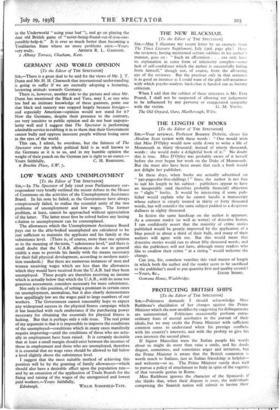LOW WAGES AND UNEMPLOYMENT [To the Editor of THE SPECTATOR]
Sta,—In The Spectator of July 22nd your Parliamentary cor- respondent very briefly outlined the recent debate in the House of Commons on the activities of the Unemployment Assistance Bogrd. In his note he failed, as the Government have always conspicuously failed, to realise the essential- unity of the two problems of unemployment and low wages. The former problem, at least, cannot be approached without appreciation of the latter. The latter must first be solved before any lasting solution to unemployment can be contemplated.
The allowances which the Unemployment Assistance Board pays out to the able-bodied unemployed are calculated to be just sufficient to Maintain the applicant and his family at the subsistence level. (There is, of course, more than one opinion as to the meaning of the term, " subsistence level," and there is small doubt that the U.A.B. allowances do not in general enable a man to provide his family with the means necessary for their full physical development, according to modern nutri- tion standards.) But there are numerous instances of men and women receiving wages which are less than the allowances which they would have received from the UA.B. had they been unemployed. These people are therefore receiving an income which is actually below that which the U.A.B., with its none too generous assessment, considers necessary for mere subsistence.
Not only is this position, of setting a premium in certain cases on unemployment, anomalous, but it also clearly demonstrates how appallingly low are the wages paid to large numbers of our workers. The Government cannot reasonably hope to expect any widespread success in the physical fitness campaign which it has launched with such exuberance if the purchasing power necessary for obtaining the essentials for physical fitness is lacking. But that is perhaps only a side issue. The real point of my argument is that it is impossible to improve the conditions of the unemployed—conditions which in many cases manifestly require improving—until the conditions of those who are actu- ally in employment have been raised. It is certainly desirable that at least a small margin should exist between the incomes of those in employment and those who are unemployed, therefore it is essential that no wage rates should be allowed to fall below a level slightly above the subsistence level.
I suggest that the most suitable method of achieving this position will be by the granting of family allowances—which should also have a desirable effect upon the population rate— and by an extension of the application of Trade Boards for the fixing and raising of the, wages of the unorganiied and lowest paid workers.—Yours faithfully, Edinburgh.
WILLIE SCHOFEELD-TATE. •


































 Previous page
Previous page